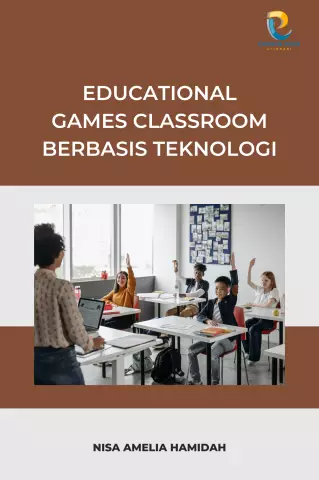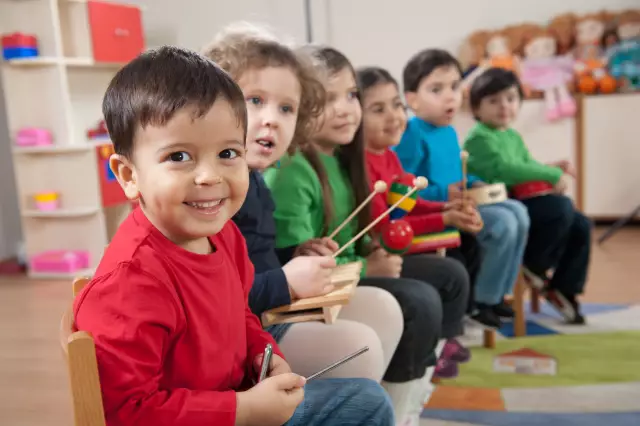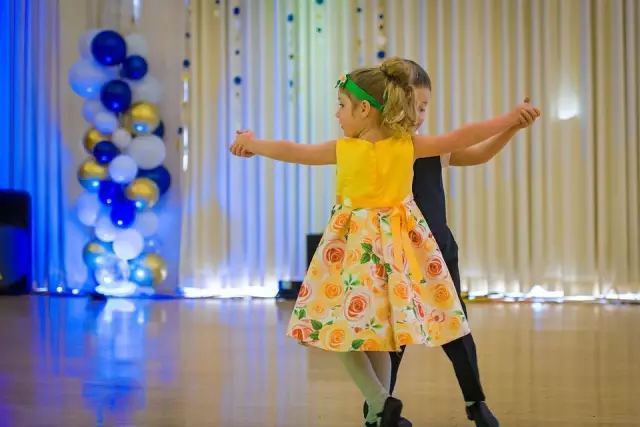- Author Rachel Wainwright wainwright@abchealthonline.com.
- Public 2023-12-15 07:39.
- Last modified 2025-11-02 20:14.
Educational games in the classroom
Having reached the age of 6-7 years, the child goes to school, for which he was probably prepared in advance, so he already knows how to read, count and write a little. Usually, once in a school environment, at first it is difficult for any child to get used to the rules that must be obeyed, because unlike kindergarten, where the child slept, played and studied very little, at school you need to sit quietly for a whole lesson and rest only during breaks …

Parents who were seriously involved in preparing their child for school, in most cases, resorted to the help of various educational games that turned tedious and difficult learning to write, counting and reading into fun and exciting games, so that the child himself, without noticing it, learned the necessary for further education in school information.
The experience of using educational games takes place in many educational institutions, where primary school students, through various games in a team, learn and learn more and more complex information. Educational games in the classroom, of course, must be well organized by the teacher, who needs to carefully select educational entertainment appropriate for the age of his wards. So first-graders are unlikely to be able to successfully cope with tasks corresponding to the level of knowledge of even second-graders. The effectiveness of such educational games in the classroom surprises both teachers and parents, and the kids are delighted with them, because the school becomes not only an educational, but also a fun place.
Educational games for grade 1
The collective development of the intellectual abilities of first graders is quite simply carried out with the help of a variety of didactic and developmental games in the classroom. Such games are designed in such a way as to develop the already existing skills and abilities of first graders, teach them to think logically, quickly grasp and assimilate information, and select the right solution to certain problems.
Many teachers are skeptical about such educational games for first graders, because not everyone will be able to see in the raging turmoil and noise that accompanies this way of teaching, an effective method of learning new information. However, despite the mistrust and skepticism shown, many teachers have repeatedly been convinced that educational games allow kids to learn math, grammar and vocabulary much faster than traditional teaching methods.
The competition present in developmental games for grade 1 motivates and energizes students, adds to their desire to quickly absorb information, which determines the child's personal result or the result of the team in which the child is.
When they come to school for the first time, some kids may be able to write and read, but there are children who do not yet have such skills, so educational games in the classroom conducted by the teacher should not be too difficult. The main direction of such educational games for first graders is the development of intelligence, attentiveness, logical thinking and imagination of students.
Educational games for grade 2
The experience gained during the first year of schooling allows the child to read and count, and constant practical exercises, carried out in the copybook, develop handwriting and writing speed in second graders. In the second grade, students move on to the direct study of mathematics, examples and problems become more and more complex. Along with the increase in the complexity of the information received at school, the educational games conducted in the classroom become more complicated. Now students can be asked to solve math examples and problems at speed, read or count.
A fun educational game for grade 2 aimed at developing the vocabulary of students is the game "Difficult rhyme". The teacher invites second graders to come up with rhymes for such complex words as:
- Portfolio;
- Carpet;
- Chandelier;
- Armchair;
- Kettle.
Then all the children are divided into groups of 5-6 people, the task of each team is to compose couplets from the rhymes received. The team with the most couplets wins.
An equally interesting educational game for children in the classroom will be the game "Confused sentences". The teacher prepares several sentences in advance in which the words will be out of place. Such proposals should be as follows;
- A butterfly, a girl, on, painted, asphalt - a girl painted a butterfly on the asphalt;
- There was a big red car - the car was big and red;
- On, sat down, striped, flower, bee - striped bee sat on a flower.
The task of each student is to independently compose sentences from verbal abracadabra. The winner is the one who copes the fastest.
Educational games for grade 3
In the third grade, due to the fact that children already have a fairly extensive knowledge base, can easily memorize words and poems, the teacher can use a school production of a play, fairy tale or short story as an educational game for grade 3.
Such joint work on the development of scenery, costumes and learning words and remarks will help children learn a lot, learn new words for themselves and learn their meanings. All children in the class can be divided into two or three teams, each team must perform with its own performance on a given topic. The teacher must prepare a script for each team, while the children, in turn, independently choose who will play whom. In a few lessons, they will have to learn words, from scrap materials (paper, pencils, glue) make decorations and costumes (masks, hats, etc.), and then present their performances to each other. The team that plays the best performance wins.
Educational games for grade 4

The fourth grade of the school is the last before the children move to the big school. The tasks of educational games for grade 4 may already be more complicated and versatile.
For fourth-graders, you can arrange various Olympiads based on the material covered in all previous years. The teacher prepares assignments in advance in which students will have to show ingenuity and logical thinking. These can be various math problems, in which the teacher will deliberately mix up the words in places, so that before solving them, the children will have to restore the correct condition.
Also, in such educational games in the classroom, you can add tasks for the knowledge of the languages being studied. Usually in elementary schools all children learn their native language and one additional language (English). In several sentences in the native and English languages, the teacher must make several grammatical errors, so each student needs to carefully read and, using the vocabulary and learned rules, correct them.
Be sure to include creative tasks in such Olympiads, in which students will have to draw pictures on a given topic. Or you can ask the children to compose quatrains in which certain words must be present. The winner is the student who completes all tasks the fastest.
Found a mistake in the text? Select it and press Ctrl + Enter.






